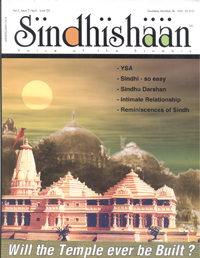![]()
Hundraj Dukhayal : Man and Poet
by Dr. Motilal Jotwani

New Delhi, Jan.1, 2003 : ln its meeting held on the eve of New Year 2003, the General Council of Sindhi Academy. Delhi decided that Padamshri Hundraj Dukhayal (b. 1910) be given away its most prestigious Millennium Award of Rs. eleven lacs for his life time services to Sindhi poetry, at his residence in Adipur (Kutch) on or before 16 January 2003, his 94th birthday.
Shri Dukhayal’s work “in the nature of creative literary writing” has adequately met the demands of our times. Echoing what a renowned critic has said, we may say that it is not enough for Dukhayal to merely try to find the verbal equivalent of his own states of mind and feelings as also those of fellow humans; he is aware of where he himself is going and also of where he is leading them.
When Gandhiji launched the Non-cooperation Movement in 1921 and gave a nationwide call to quit Government schools in favour of national schools, Dukhayal, 11 at that time, did so. A student of national school, he started writing poetry at the age of 14. He used to compose national songs and sing them in public processions and meetings which were organised in support of Indian Independence. In 1930, at the time of Salt Satyagraha, he organised Bandar Sena (Monkey Brigade) and Swaraja Sena (Self-rule Brigade) the student-members of which took active part in the picketing of wine shops and foreign cloth shops. Under the auspices of Bandar Sena Dukhayal launched the Hanuman, a weekly in Sindhi, reminiscent of Hanuman’s role in the great Ramayana war. As the things would have it, he was arrested in 1931 for writing ‘seditious’ articles against the British rule. He was under trial, but was released on account of Gandhi - Irwin pact. In 1932, he was detained in Hyderabad, Sindh Central Jail for three months, Soon after release, he was rearrested in Larkana and sentenced to rigorous imprisonment for 23 months and fine of Rs. 200.
Subsequent to the release in 1934, Dukhayal joined as a teacher in one of Harijan schools in Larkana and also started a Harijan bank. In 1937, he launched another weekly in Sindhi, this time called Dukhayal after his nom-de-plume. He continued to publish it through 1949; on Gandhiji’s instructions, he stayed back in Sindh even after partition of the country in 1947 to carry on his constructive work.
In 1941, in the village of Ratodero in Larkana district, Dukhayal established Gandhi Seva Ashram where spinning wheels were manufactured and paper was handmade. More than a dozen persons dedicated to constructive work lived there in the Ashram. During the “Quit India Movement” of 1942, Dukhayal was detained in jail for two months. Soon after the release, he was rearrested in Larkana and sentenced to rigorous imprisonment for three months.
Dukhayal regards all these five imprisonments for the national cause as a turanga tirtha yatra or a prison pilgrimage, but not the sixth one which was imposed on him by the government of Pakistan, in 1948. A charge was levelled against him that he had been manufacturing arms in Ratodero Ashram in a plot to unseat the Government of Pakistan. During the search, an ordinary kitchen knife was found from the premises of the Ashram. In the trial he was sentenced to rigorous imprisonment for six months and fine of Rs. 200. In appeal, the sentence was reduced to imprisonment for two months or fine of Rs. 500. After he was released from jail, Dukhayal remained in Ratodero, Larkana and Karachi for two months. Gandhi Seva Ashram of Ratodero had been declared defunct and it became increasingly more difficult for him to continue with his constructive activities. In 1949, he also migrated to India.
He devoted his services to the cause of rehabilitating the displaced persons from Sindh up to the year 1951, when Acharya Vinoba Bhave started his Bhoodan Movement and he joined it. For about 12 years, he was with Vinobaji in his great mission on foot. Thereafter he settled down in Gandhidham/Adipur (Kutch) and established Sarvodya Press from where he published Dharti Mata in Sindhi with a view to encouraging the Sarvodya ideas and actions. Besides, he came to establish Sindhi schools in the area and work for them.
Dukhayal has published a number of books containing national and patriotic songs and poems, both in Sindhi and Hindi, which have been sold in lakhs of copies.
The grateful nation in the government of India conferred on him Padamshri for his great services to Indian Life and letters.



